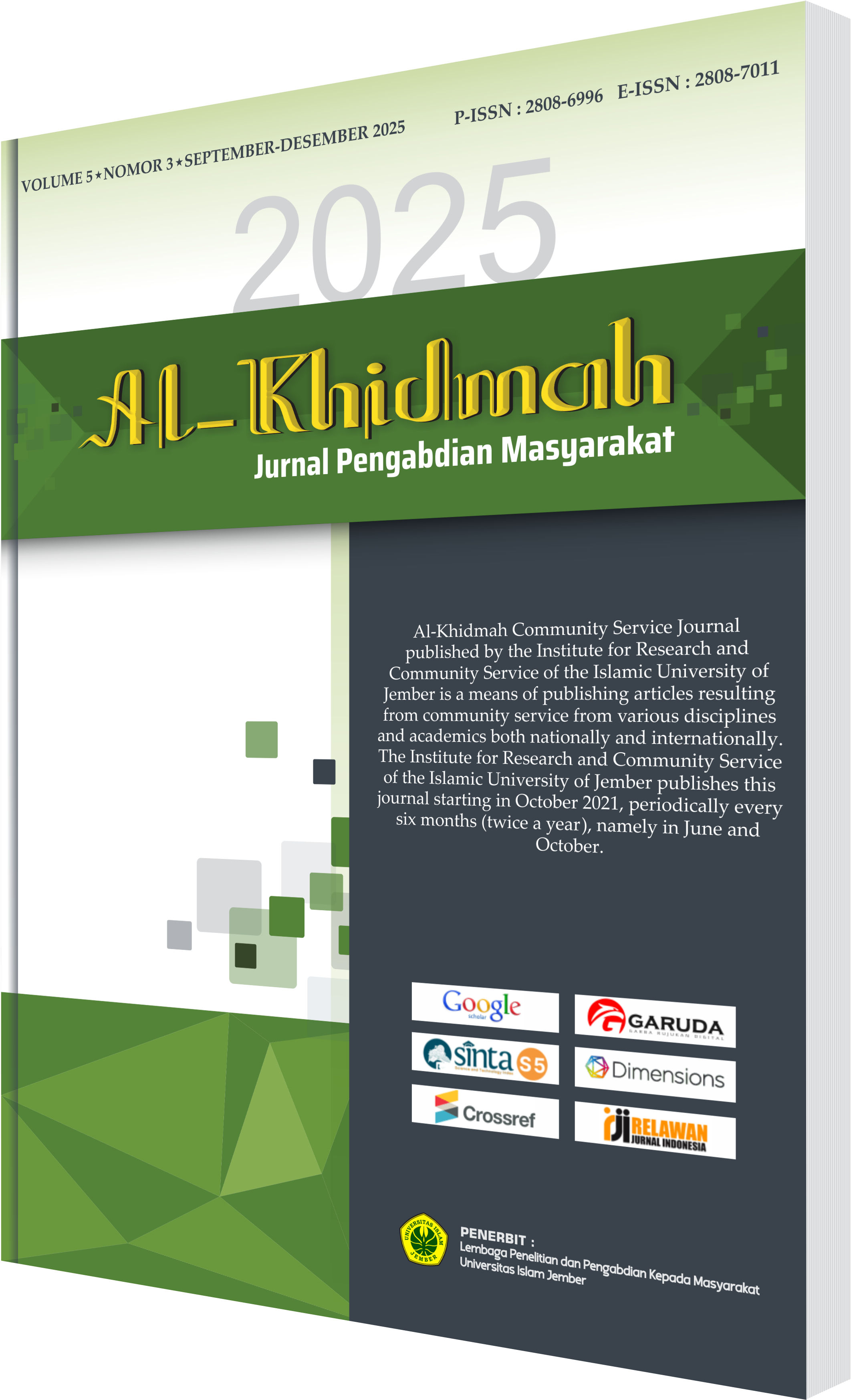Pelatihan Penelitian Tindakan Kelas (PTK) Bagi Guru Biologi dan IPA Kota Salatiga: Strategi Peningkatan Kompetensi Penelitian Berbasis Kelas
DOI:
https://doi.org/10.56013/jak.v5i3.4821Keywords:
classroom action research; teacher training; professional developmentAbstract
The Classroom Action Research (CAR) training for Science and Biology teachers in Salatiga aims to enhance pedagogical competence through a research-based approach. The implemented activities adopted a collaborative-participatory model, involving eight teachers through three main stages: (1) a joint needs identification with the local teachers' working group (MGMP), (2) intensive training across four interactive sessions, and (3) continuous mentoring. The training methods combined the presentation of conceptual material (CAR framework, data collection techniques), hands-on proposal drafting practice, and simulations on using research tools like Mendeley for reference management. Evaluation results indicated positive outcomes, with 100% of participants rating the facilitators as highly competent and 87.5% stating the material was presented clearly. However, a need for deepening practical aspects was identified, as 12.5% of participants still experienced difficulties in application. Thematic analysis of the feedback revealed three main recommendations: (a) increasing the portion of case-based learning activities using real examples, (b) developing applied biology-based modules, and (c) integrating technology such as digital microscopy in advanced training. The program's success is reflected in 80% of participants' ability to design relevant CAR proposals during the training, and the establishment of an online learning community for post-activity mentoring. These findings emphasize the importance of a teacher training model that combines applicable theory, intensive mentoring, and technological support, particularly to bridge the gap between academic research and classroom practice.
Downloads
References
Best, S., & and Williams, S. J. (2025). Improving the way we do action research in quality improvement. Production Planning & Control, 36(2), 165–176. https://doi.org/10.1080/09537287.2024.2315154
Bleach, J. (2016). Learning networks – enabling change through community action research. Educational Action Research, 24(1), 21–33. https://doi.org/10.1080/09650792.2015.1135069
Borg, E., & Finne, J. (2024). A scoping review of school leadership practices in Lesson Study. Cogent Education, 11(1). https://doi.org/10.1080/2331186X.2024.2353470
Cox, R., Cheryl, H., Sarah, F., Tiffany, H., Leila, S., Laura, W., Kiana, A., Nigel, D., & and Plush, T. (2021). Creative action research. Educational Action Research, 29(4), 569–587. https://doi.org/10.1080/09650792.2021.1925569
Dignath, C., Rimm-Kaufman, S., van Ewijk, R., & Kunter, M. (2022). Teachers’ Beliefs About Inclusive Education and Insights on What Contributes to Those Beliefs: a Meta-analytical Study. Educational Psychology Review, 34(4), 2609–2660. https://doi.org/10.1007/s10648-022-09695-0
Dusty, C. E. (2024). The transformative power of action research. Educational Action Research, 32(2), 165–168. https://doi.org/10.1080/09650792.2024.2321728
Eungoo, K., & Hwang, H.-J. (2023). The Importance of Anonymity and Confidentiality for Conducting Survey Research. Journal of Research and Publication Ethics, 4(1), 1–7. https://doi.org/10.15722/jrpe.4.1.202303.1
Feldman, A., Altrichter, H., Posch, P., & Somekh, B. (2018). Teachers Investigate Their Work: An Introduction to Action Research across the Professions (3rd ed.). Routledge: London. https://doi.org/https://doi.org/10.4324/9781315398822
Grubenmann, S. (2016). Action Research. Digital Journalism, 4(1), 160–176. https://doi.org/10.1080/21670811.2015.1093274
Guerra, A., Chen, J., & Du, X. (2025). Teacher ’ s agency in education for sustainable development : an East-West collaborative Erasmus programme using Q methodology. International Journal of Sustainability in Higher Education, 25(9), 155–176. https://doi.org/10.1108/IJSHE-05-2023-0155
Jhang, F. H. (2020). Professional Development in Education Teachers ’ attitudes towards lesson study , perceived competence , and involvement in lesson study : evidence from junior high school teachers. Professional Development in Education, 46(1), 82–96. https://doi.org/10.1080/19415257.2019.1585383
Kemmis, S, & McTaggart, R. (2005). Participatory action research: Communicative action and the public sphere. In The Sage handbook of qualitative research, ed. N. Denzin and Y. Lincoln. Thousand Oaks, CA: Sage.
Kemmis, S, & Smith, T. . (2008). Praxis and praxis development. In Enabling praxis: Challenges for education. Rotterdam: Sense.
Kemmis, Stephen. (2010). What is to be done? The place of action research. Educational Action Research, 18(4), 417–427. https://doi.org/10.1080/09650792.2010.524745
McNiff, J. (2002). Action Research: Principles and Practice (2nd ed.). Routledge: London. https://doi.org/https://doi.org/10.4324/9780203199961
Mohajerzad, H., Martin, A., Christ, J., & Widany, S. (2021). Bridging the Gap Between Science and Practice: Research Collaboration and the Perception of Research Findings. Frontiers in Psychology, 12(December), 1–12. https://doi.org/10.3389/fpsyg.2021.790451
Niemi, R. (2019). Five approaches to pedagogical action research. Educational Action Research, 27(5), 651–666. https://doi.org/10.1080/09650792.2018.1528876
Nuňez, A. B., & Despi, D. E. (2025). Enhancing Classroom Instruction of Teachers Through Professional Development Programs. International Journal of Innovative Science and Research Technology, 10(3).
Pavez, P., & Pavez, P. (2021). The Interpreter and Translator Trainer Dialogic education in the interpreting classroom : action research for developing simultaneous interpreting quality assessment tools assessment tools. The Interpreter and Translator Trainer, 15(3), 360–377. https://doi.org/10.1080/1750399X.2021.1906078
Reason, P., & Bradbury, H. (2008). The SAGE Handbook of Action Research (2nd ed.). SAGE Publications Ltd. https://doi.org/10.4135/9781848607934
Rutten, L., Butville, D., Smith, W., & Dvir, B. (2023). Practitioner Inquiry for Turbulent Times: Learning to Take an Inquiry Stance Toward Teaching Difficult Topics Through a Teacher Inquiry Community. Journal of Practitioner Research, 8(2). https://doi.org/10.5038/2379-9951.8.2.1251
Simmons, M., Mairi, M., Sarah Elaine, E., Barbara, B., & and Jacobsen, M. (2021). Reflection as pedagogy in action research. Educational Action Research, 29(2), 245–258. https://doi.org/10.1080/09650792.2021.1886960
Somekh, B., & and Zeichner, K. (2009). Action research for educational reform: remodelling action research theories and practices in local contexts. Educational Action Research, 17(1), 5–21. https://doi.org/10.1080/09650790802667402
Vangrieken, K., Meredith, C., Packer, T., & Kyndt, E. (2017). Teacher communities as a context for professional development: A systematic review. Teaching and Teacher Education, 61, 47–59. https://doi.org/https://doi.org/10.1016/j.tate.2016.10.001
Vogelzang, J., & Admiraal, W. F. (2017). Classroom action research on formative assessment in a context-based chemistry course. Educational Action Research, 25(1), 156–167. https://doi.org/10.1080/09650792.2016.1177564
Downloads
Published
How to Cite
Issue
Section
License
Copyright (c) 2025 Risya Situmorang, Natalia Rosa Keliat, Susanti Pudji Hastuti, Wawan Pat Atmojo, Vivian Yolanda Halim, Rafla Galang Priatama

This work is licensed under a Creative Commons Attribution-ShareAlike 4.0 International License.





